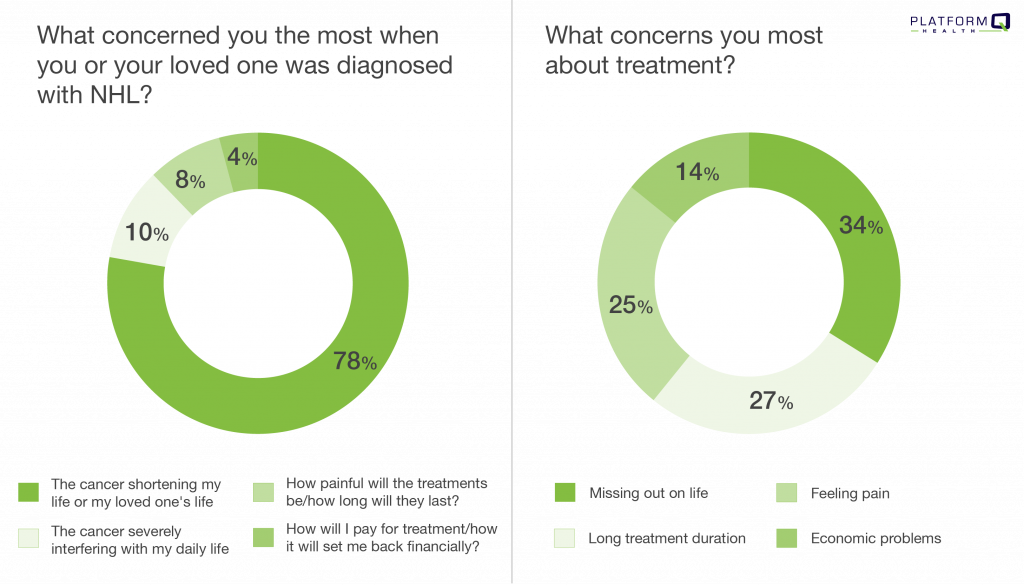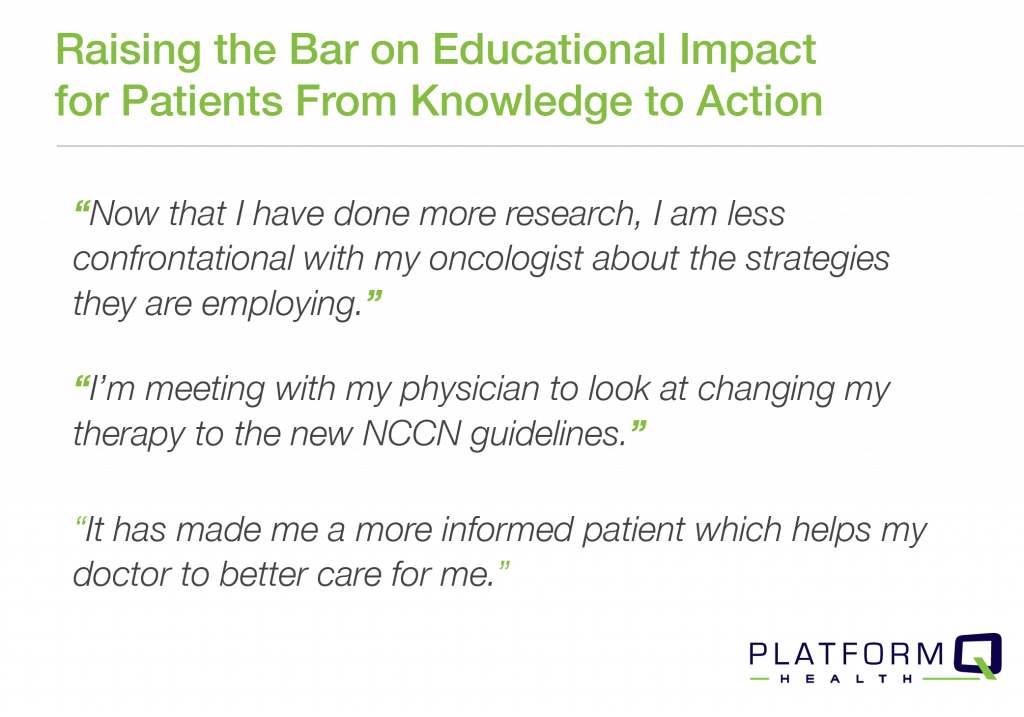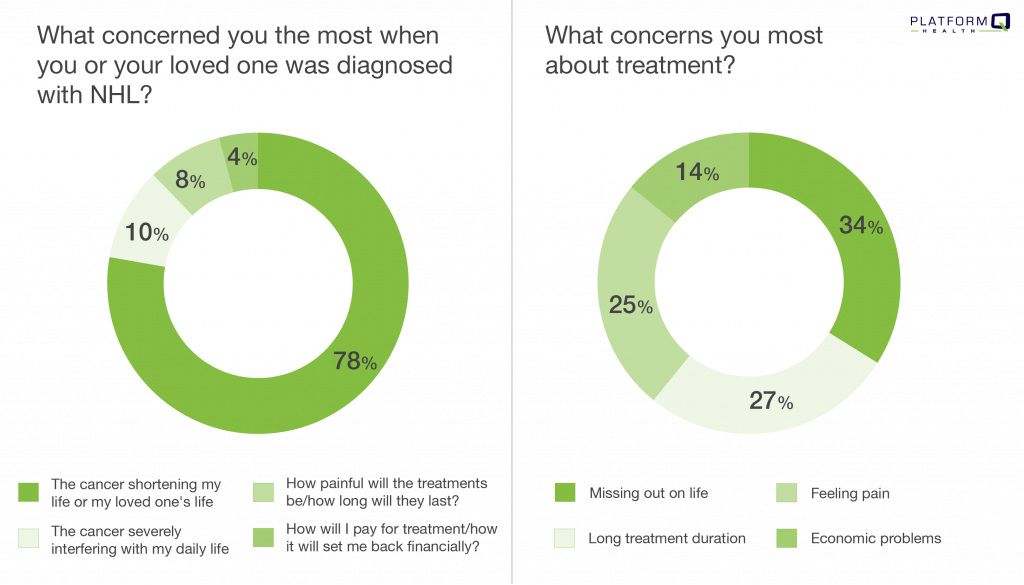The inaugural program for CancerCoachLive, PlatformQ Health’s educational channel for online patient education about different forms of cancer, was launched in 2016 through a partnership with The Leukemia & Lymphoma Society (LLS) focusing on educating patients with B-cell non-Hodgkin lymphomas (NHL). Building on LLS’s goal to empower patients through education, this program aimed to improve knowledge and self-efficacy on B-cell NHL and offer strategies to enhance quality of life through better disease and side effect management.
The educational activity was broken into four shorter “chapters” with individual educational goals for each:
- Understanding the Diagnosis: What does it mean to have a B-cell non-Hodgkin Lymphoma?
- What tests to expect for B-cell non-Hodgkin Lymphomas
- Treating B-Cell non-Hodgkin Lymphomas
- What to do between doctor visits and treatments: self-care, resources, and Q&A
Real-time and asynchronous polling enabled panelists to pose questions to the live audience and address the topics of greatest concern to viewers: shortening of life, anxiety around a potentially painful workup process, missing out on life events, helpful types of support (individual professional support, support groups, online discussion groups, etc), and methods of seeking support.

Reaching Patients Where They Are with Education Means Higher Engagement and Better Outcomes
An integrated marketing plan between the partnered organizations enabled patients and caregivers to access the educational program across various platforms including, CancerCoachLive, Facebook Live and Leukemia and Lymphoma’s website. Each platform provided different patient engagement experiences and results. For example:
CancerCoachLive focused on long form engagement, the highest value participation in the program, with 500+ total views. Those participating in the live broadcast watched an average of 43 minutes and submitted 42 questions to the expert panel in the one-hour session.
The Leukemia & Lymphoma Society, in addition to driving patients and caregivers to CancerCoachLive for the full experience, hosted a dedicated page on their website and uploaded short clips from each chapter to their YouTube channel, adding an additional 1,000 program views from highly-targeted participants actively seeking out information from this industry leader.
Social media also played an important role in disseminating the program information. The four chapters garnered a reach of 32,000 with more than 25,000 total views.

Patients and caregivers are more motivated than ever
By leveraging our educational platform, partnerships with key advocacy organizations and extended reach into the places patients organically visit, we’re able to place content that patients and caregivers need with precision. And it works. Post-education surveys showed:
- 100% of learners reported learning “some” or “a lot” about statistics of NHL and potential outcomes of a b-cell NHL diagnosis.
- 97% of learners reported learning “some” or “a lot” about identifying signs and symptoms of B-cell non-Hodgkin lymphoma (NHL)s.
- 97% of learners reported learning “some” or “a lot” about the laboratory, diagnostic and imaging tests that may be performed for B-cell NHLs.
- 92% reported some/a lot about identifying realistic expectations of treat response and side effects of treatment.
Pre-, post-test and follow up surveys gauged participant learning and retention, frequently showing statistical significance when comparing survey responses, further supporting participant improvements in knowledge.
LLS Executive Director, Education & Integration, Karen Demairo echoes the sentiment, “Education is one of the best tools we can provide to our patients. By educating them about their disease and treatments, they are able to make better decisions throughout their cancer journey.”
Raising the Bar on Educational Impact: From Knowledge to Action
How do we use online patient education to turn knowledge into action? A recent survey showed that 93% of patients are likely to ask their physician or another health professional about health information they learn from an influential source. As educators, one of the most important things we can do is ensure the right education gets to the right patient at the right time to facilitate and enhance the clinician-patient shared decision-making journey – and, ultimately, their outcomes. This is where education can move the needle, by empowering a patient to become a more active, informed participant in their cancer care.
Follow-up surveys showed almost 6 out of 10 patients experienced improved communication and collaboration with their healthcare provider since participating in the educational program. In their own words:
“Now that I have done more research, I am less confrontational with my oncologist about the strategies they are employing. I have also pushed for more psychological support, and to participate in exercise programs.”
“I’m meeting with my physician to look at changing my therapy to the new NCCN guidelines.”
“I am more confident with asking questions and sharing my uncertainty about treatments and side effect information.”
“I feel we are more on the same page and the doctor is paying more attention of what I think is important to me.”
“It has made me a more informed patient which helps my doctor to better care for me.”
“Set expectations that I’m asking for insights not absolutes. Express the acknowledgement of inherent uncertainty and change.”
“[My doctor] involves me more in conversations about treatments since I told her I watched the program and want to learn more.”
Patient Education on B-Cell Non-Hodgkin Lymphomas from Diagnosis to Treatment was presented in collaboration with The Leukemia & Lymphoma Society & The University of Nebraska Medical Center and supported by an educational grant from Pharmacyclics LLC, an Abbvie Company and Janssen Biotech, Inc., administered by Janssen Scientific Affairs, LLC, and a grant from Genentech.
For more information about online patient education opportunities and the PlatformQ Health network of therapeutically-aligned channels, email Lauren Alford at LAlford@platformq.com.

